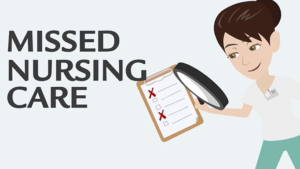By Rose O. Sherman, EdD, RN, NEA-BC, FAAN
 With nationwide staff shortages, units are short-staffed on many shifts. A nurse leader recently asked me why we do not have frank discussions about the level of missed nursing care happening daily throughout the country. She remembered as a new graduate that when their team was short-staffed, the experienced nurses on the team told her to skip the baths that day and do “pits and pubes.” They were precise with her about what not to do. Her current team is composed primarily of new graduates. These young nurses are deciding what care to stop doing without specific guidance.
With nationwide staff shortages, units are short-staffed on many shifts. A nurse leader recently asked me why we do not have frank discussions about the level of missed nursing care happening daily throughout the country. She remembered as a new graduate that when their team was short-staffed, the experienced nurses on the team told her to skip the baths that day and do “pits and pubes.” They were precise with her about what not to do. Her current team is composed primarily of new graduates. These young nurses are deciding what care to stop doing without specific guidance.
When she brought this up in her hospital leadership, she was told that everyone was expected to meet all patient care expectations – no exceptions. She was frustrated because this expectation is highly unrealistic when units run short-staffed daily. Her unit had two pressure ulcers the previous quarter, something that would never have happened in the past. She learned that some nurses had stopped turning patients because they did not have time to complete all their assignments. These young nurses with limited critical thinking skills were deciding what care to skip and sometimes did not make the right choices. Decisions about what care to miss without significantly impacting patients are complex and require critical thinking.
Dr. Beatrice Kalisch is well known for her research and assessment instrument on missed nursing care. Pre-pandemic, the nine key areas where nurses missed care included the following:
- Ambulation
- Turning
- Delayed or missed feedings
- Patient Education
- Discharge planning
- Emotional support
- Hygiene
- Intake and output documentation
- Surveillance
In her extensive research, Dr. Kalisch found that a significant percentage of nursing care was missed (pre-COVID), as demonstrated in one large study.
Ambulation three times per day or as ordered – missed 76% of the time
Mouth care – missed 64% of the time.
Medications administered on time – missed 60% of the time.
Feeding patient when the food is still warm – missed 57% of the time.
Patient teaching – missed 55% of the time.
Response to call light within 5 minutes – missed 50% of the time.
Patient bathing/skincare – missed 45% of the time.
Emotional support to the patient and family – is missed 42 % of the time.
Dr. Kalisch found that when missed care increases – nurses become less satisfied, and patient outcomes such as infections and pressure ulcers are directly impacted. She linked teamwork, lack of a healthy work environment, and staffing to missed care. A lack of teamwork alone accounted for 11% of the variance in missed care. We see all this play out in real time in our healthcare environments today. Most acute care units today are staffed by fewer nurses with significantly less tenure than when Dr. Kalisch did her research. Making decisions about what care to miss without significantly impacting patients is complex and requires critical thinking.
Yet we are leaving our nurses to make their own decisions. I would urge leaders to talk with staff about how they make decisions about what care to omit and how frequently they do not do the following:
- Ambulate patients as ordered.
- Turn patients every 2 hours.
- Feed patients when the food is warm.
- Medicate patients within a one-hour window 30 minutes before or after the scheduled time.
- Assess vital signs as ordered.
- Monitor patient intake and output.
- Fully document all necessary data.
- Teach patients about their illnesses and the tests they will undergo.
- Provide emotional support to patients and families.
- Give baths and skin care.
- Do oral care.
- Do discharge teaching.
- Perform bedside glucose monitoring as ordered.
- Assess patients on each shift.
- Provide IV and Central line care per hospital policy.
- Respond to call lights within 5 minutes.
- Give PRN medications within 15 minutes after a request.
- Assess medication effectiveness.
- Attend interdisciplinary care planning conferences.
- Do skin and wound care as ordered.
These young nurses need our help in critically thinking through the decisions they are already making about what care can be missed. We need frank discussions about this in our clinical environments of care.
© emergingrnleader.com 2023
Rebuilding Your Nursing Team in 2023: Coming Together after Falling Apart – Click Here for the Flyer
Now Available at Amazon and all Major Book Sellers

Other Programs/Books Your Leaders May Find Valuable
From Traditional Nurse Leader to Nurse Leader Coach – Click Here for the Flyer
For new leaders and emerging leaders, consider doing The Nuts and Bolts of Nursing Leadership Program – Click Here for the Nuts and Bolts Flyer Final
New Leader Development Option in 2023 – Team Coaching Designed to the Unique Needs of Your Organization Leader Coaching Brochure
Read the Nurse Leader Coach – Available at Amazon and Other Book Sellers
Recommended Book by the Association of Critical Care Nurses – The Nuts and Bolts of Nursing Leadership: Your Toolkit for Success


 LinkedIn
LinkedIn Instagram
Instagram